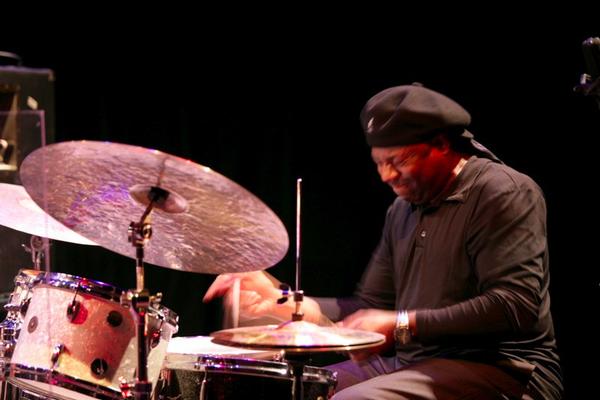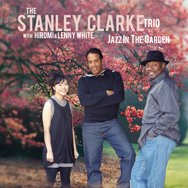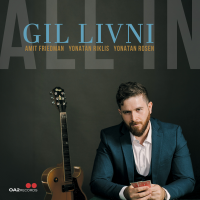Home » Jazz Articles » Interview » Lenny White: Jazz/Rock Collides Again
Lenny White: Jazz/Rock Collides Again
LW: As an artist, there is the art of internal necessity, and art of external means. The artist wants to fulfill what's in his heart, and do what he wants to do, but then again, there are the responsibilities of family, mortgages, car payments or whatever, that you have. You have those obligations and it kind of slants what you do. Sometimes. I'm not saying it as a generality, but sometimes that happens.

AAJ: The thing is, prostitution never works. It's always somebody's downfall. You can't do it. You've got to have enough integrity to stay with your own vision.
LW: But, see, I can give you a converse of that, because there's always an ultimate. And you say it never works, and I say that's debatable, because there are people that are making tons of money. Here's the point: they're making tons of money doing things that whatever "powers that be" deem to be art. You never know what causes that person to make that decision. That person may have a family, can't feed the family.
Art is something that you really can't argue about. For instance, go and look up the word "classical"; the word means relating to or characteristic of ancient Greece or Rome alone [the original Latin classicus meant belonging to a class, or belonging to the first or highest class.] That's what "classical" means. So you say "classical," and that supposedly gives you credibility in terms of art... if it's classical art, classical literature, classical whatever. So, you've taken this definition and expanded on it, and so now it encompasses a great deal of things. So anything that has the moniker of "classical" on it is supposed to be accepted and revered. But you have Andy Warhol, who had his form of art, that people call, quote, unquote, "pop" art, and it wouldn't be deemed as viable or accepted as a Gauguin or Monet painting. Who's to say that this is more valuable than that?
But what's happened throughout all of the years is that if you do something that, maybe, the public grasps and the "powers that be," the business behind it, says is viable, then that artist is vaunted and becomes successful monetarily. So, it's all debatable. As an artist, you have to make your choices, and you have to live with the choices that you make. And what you would hope is that you have a place to get your art out. It's the biggest obstacle. The biggest thing is to be able to have a marketplace for your art, or have someone hear what it is that you're presenting. Read what it is you're presenting. See what it is you're presenting. An artist has to have life.
I'm not passing judgment on what people do. Personally, I may not like it. Personally, I didn't like what Kenny G is doing. But, let me rephrase that and say that this is what the problem is for me. It's not that I don't like what Kenny G is doing. Let me be clear about that. It's not that I don't like the music, because he is a viable artist. He can play melodies and it's great. What I [take] offense to is that these powers that be, critics or whoever, say that it is jazz.
And they say that, from a marketing standpoint, it's much more viable than what Charlie Parker did. Or much more viable than what John Coltrane did. To the point where Kenny G is considered the greatest-selling instrumentalist of all time. I mean, was that public opinion, or was public opinion slanted to form from a marketing standpoint so that the company behind what Kenny did made money? I don't plan to reinvent the wheel. I just want to find my space on it.
 AAJ: How do you make a living? How do you do this and do your art form, whatever it is, and succeed and make money and do all the things that you want to do? There was this interview that Chick [Corea] did 25 or so years ago, and he had a very simple answer. He said that the way he looked at it, the very best promotion was a good performance; that you can have great articles written about you, you can do all the marketing and razzle-dazzle crap, but if you go out and put on a great show, people will walk around afterward telling all their friends about it.
AAJ: How do you make a living? How do you do this and do your art form, whatever it is, and succeed and make money and do all the things that you want to do? There was this interview that Chick [Corea] did 25 or so years ago, and he had a very simple answer. He said that the way he looked at it, the very best promotion was a good performance; that you can have great articles written about you, you can do all the marketing and razzle-dazzle crap, but if you go out and put on a great show, people will walk around afterward telling all their friends about it.LW: Well, you know, Chick, for me, has always been an artist. He hasn't wavered, and he's always given a great performance. So that's why he's able to continue doing what he does, changing up and always has an audience. I'm not here to try to pit this person against that person. I think that's what the problem is, that's what I find offensive. I find it offensive when someone validates someone's art over someone else's art. It's a matter of opinion if you like it or not like it, but there are people that, you know, have careers destroying other people's creations. These people don't understand how the creative process works and how much effort it takes to get to a creation.
A lot of times, what I know most musicians today find offensive [about some of the music today] is that they can't hear the commitment. They can't hear any sacrifice. I'm from an era where you had to be a musician to be a musician. To make music, you had to be a musician! That's not the case anymore. I'm not going to go around hating the world because of that, because it takes up too much energy. In the span of a day there are things that I could be doing to maybe help me grow as an artist, as a man, and as a person. I don't want to waste that energy.
AAJ: But you are somewhat dependent on these facilitators, the people who communicate about it, the people who write reviews, the people who market things. These guys can wreck a career without even thinking about it.
LW: That's true, but I think presentation has a great deal to do with how you affect someone with your creation. How you present it is very, very important. And more so now than before. If you think about the big pop acts, that's what it is—it's all about presentation. It's all about the lights, the costume changes, the pyrotechnics. There might be this much content [holds hands up a few inches apart] musically, and this much content in the presentation [holds hands wider apart to show much greater quantity.] So, if you were to have this much music [holds hands wide apart] and this much in terms of presentation [holds hands same distance apart,] you probably could make a very, very long-lasting effect.
I think that that's one of the things that the 21st century artist should concentrate on: having a balance with the content and the presentation, so that the content is not this [holds hands narrowly apart] and, if you can't sing or you can't do music, your presentation's like that [holds hands as wide apart as possible.]
The converse of this is that you're a great artist, you've got this great talent, and you think that's all it takes to get you over. I think, as a 21st century artist, these things have to be a little bit more balanced, because the audience has changed. What was [once] deemed to be great art is not, well, I'm not saying that it's not, but the parameters have changed.
AAJ: You made some new fans with the Return to Forever tour—the presentation of it was fabulous.
LW: Well, this is what I'm talking about. This is the plight of the 21st century artist. You know, the parameters have changed in the 21st century, and we're much more of a visual society. And it's not just talent that gets you over any more. A perfect example is someone like Michael Jackson, who was extremely talented, and he put on a great show. And that's why his effect is going to be long-lasting and very, very deep.

AAJ: There have been a few, in the history of entertainment, who seemed to know how to put all the elements together, but that guy was in a class of his own.
LW: That's the epitome, because he lived in a time when technology had major advances, and he was able to use those major advances to further promote his talent. He was one of the first to take that art form to another place. He had great talent and then he expanded on it, and that's what a 21st century artist has to do now.
Selected Discography
Lenny White, Anomaly (Abstract Logix, 2010)
Stanley Clarke, Jazz in the Garden (Telarc, 2009)
Return to Forever, Returns (Eagle Rock, 2008)
Lenny White, Tribute to Earth, Wind & Fire (Trauma, 2004)
Lenny White, Edge (Hip Bop, 1999)
Lenny White, Renderers of Spirit (Hip Bop, 1996)
Lenny White, Present Tense (Hip Bop, 1995)
Lenny White, Attitude (Wounded Bird, 1983)
Twennynine with Lenny White, Twennynine (Wounded Bird, 1980)
Lenny White, The Adventures of Astral Pirates (Elektra, 1978)
Lenny White, Streamline (Wounded Bird, 1978)
Lenny White, Big City (Wounded Bird, 1977)
Return to Forever, Romantic Warrior (Columbia, 1976)
Lenny White, Venusian Summer, (Wounded Bird, 1975)
Return to Forever, No Mystery (Polydor/Universal, 1975)
Return to Forever, Where Have I Known You Before (Polydor/Universal)
Stanley Clarke, Children of Forever (One Way Records, 1973)
Return to Forever, Hymn of the Seventh Galaxy (Polydor/Universal,1973)
Azteca, Azteca (One Way Records, 1972)
Santana, Caravanserai (Columbia, 1972)
Joe Henderson, In Pursuit of Blackness (Fantasy,1971)
Freddie Hubbard, Red Clay (CTI, 1970)
Miles Davis, Bitches Brew (Columbia,1970)
Photo Credits
Page 1, Top: Michael Weintrob
Page 1, Azteca: Courtesy of Lenny White
Page 2, Top: Michael Weintrob
Page 2, White with Freddie Hubbard: Courtesy of Lenny White
Page 3, White with Platinum Record: Carl L. Hager
Page 3, White with Tony WIlliams: Courtesy of Lenny White
Page 4, Return to Forever: Jose Horna
Page 5, Top: Courtesy of Lenny White
Page 5, Bottom: Jose Horna
Tags
Lenny White
Interview
Carl L. Hager
United States
Jimi Hendrix
Miles Davis
Jack DeJohnette
Wayne Shorter
Dave Holland
Chick Corea
Jackie McLean
Freddie Hubbard
Herbie Hancock
Ron Carter
Joe Henderson
Return To Forever
Stanley Clarke
Airto Moreira
Flora Purim
Barry Finnerty
Bill Connors
Pete Escovedo
Paul Jackson
Tom Harrell
Carlos Santana
Steve Gadd
john mclaughlin
The Beatles
Mahavishnu Orchestra
James Brown
Led Zeppelin
Mike Clark
Sid Catlett
Tom Guarna
George Colligan
David Gilmore
Philly Joe Jones
Art Blakey
Chris Williams
charles lloyd
Rashied Ali
BENNIE MAUPIN
Joe Zawinul
Larry Young
Tony Williams
Weather Report
Headhunters
The Rolling Stones
Joni Mitchell
Van Morrison
The Doors
Charlie Parker
John Coltrane
Michael Jackson
PREVIOUS / NEXT
Lenny White Concerts
Feb
22
Sun
Stream
Support All About Jazz
 All About Jazz has been a pillar of jazz since 1995, championing it as an art form and, more importantly, supporting the musicians who make it. Our enduring commitment has made "AAJ" one of the most culturally important websites of its kind, read by hundreds of thousands of fans, musicians and industry figures every month.
All About Jazz has been a pillar of jazz since 1995, championing it as an art form and, more importantly, supporting the musicians who make it. Our enduring commitment has made "AAJ" one of the most culturally important websites of its kind, read by hundreds of thousands of fans, musicians and industry figures every month.

























